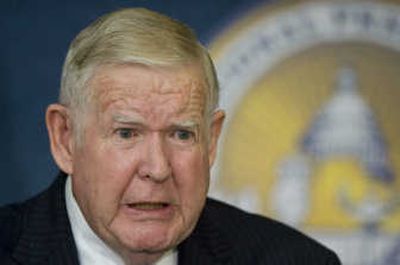Democrats propose surtax for Iraq war

WASHINGTON – Arguing it is unfair to continue to pass the cost of the war in Iraq on to future generations, three senior House Democrats on Tuesday offered a long-shot plan to raise taxes to pay for the $150 billion bill for the war in 2008.
At the same time, one of the Democrats, Rep. David Obey, of Wisconsin, chairman of the House Appropriations Committee, announced he would delay action on the White House’s war request for next year, saying he refuses “to continue the status quo.”
The tax plan, unveiled by Obey and Reps. John Murtha, D-Pa., and Jim McGovern, D-Mass., would require low- and middle-income taxpayers to add 2 percent to their tax bill. Wealthier people would add a 12 percent to 15 percent surcharge, Obey said.
Sponsors of the tax plan appeared more interested in making a point – getting people to focus on the cost of the war – than offering it as a serious proposal.
Top Democrats immediately shot down the idea, and it came under scathing assault from Republicans for linking funding for U.S. troops overseas with tax increases.
“Just as I have opposed the war from the outset … I am opposed to a war surtax,” said House Speaker Nancy Pelosi, D-Calif.
“If the new majority has proven one thing this session, it’s that no piece of legislation is immune from being converted into a vehicle to raise taxes,” said Rep. Roy Blunt, of Missouri, the GOP whip.
The tax surcharge sponsors said the idea is similar to policies put in place to pay for the Vietnam War and World War II. For Vietnam, surcharges equal to between 5 percent and 7.5 percent were in place between 1968 and 1970.
The move to defer action on President Bush’s $189 billion war funding request until next year, also announced by Obey, appears to reflect frustration over Democrats’ inability to force Bush to roll back the U.S. mission in Iraq. Obey chairs the Appropriations panel, which is responsible for war funding, and his stance seems to ensure that a stand-alone Iraq bill won’t pass this year.
Murtha, chief author of the Pentagon appropriations bill, said that that measure will instead contain enough money to fund the war until February or March. The war in Iraq is costing about $10 billion a month, with Afghanistan and other missions running about $2 billion a month.